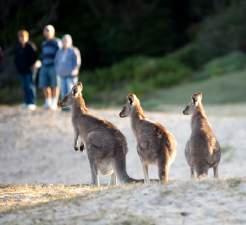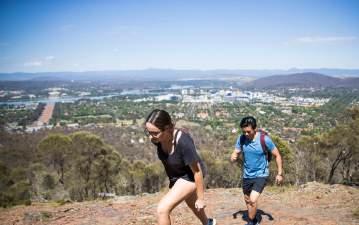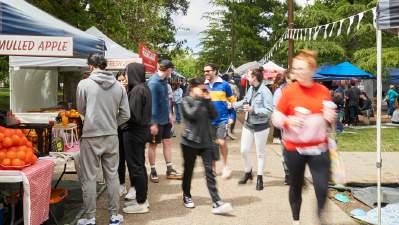





Y/OUR PLACE
Undergraduate International Student Guide 2025/26







Y/OUR PLACE
Undergraduate International Student Guide 2025/26

Welcome to ANU, from all corners of the earth. Our place is your place.
Our campus is an experience, a place to belong, to live, learn and discover you. Your time with us will introduce you to enriching courses and lifelong friends and see you living and collaborating with other passionate and talented people.
Gaining an internationally recognised degree at The Australian National University (ANU) is an amazing opportunity to dig deeper and make a difference.
Picture yourself at ANU – in Australia’s national capital, Canberra. We can’t wait to meet you.
inspiring community
17,000+ students from 100 countries
6 Nobel laureates
#1 in 13 academic disciplines in Australia1
#1 most employable graduates in Australia2
#1 most international university3
5 stars for student-to-staff ratio and staff qualifications4
#30 in the world5
The Australian National University (ANU) acknowledges, celebrates and pays respect to the Ngambri and Ngunnawal people of the Canberra region and to all First Nations Australians on whose traditional lands we live, meet and work.

University will change your life. It is a place for learning, a place where teachers shape and reshape how you see the world, and a place where you will make incredible friends.



If you choose to study at ANU, you will join students from 100 different countries. You will study with academics who are leaders in their fields, and in classes small enough that the connections you make will be genuinely meaningful. You will have radical conversations and precious time to think about how you can help to make the world a better place. And you will do all of this on an astoundingly beautiful campus, surrounded by thousands of trees, so much colourful birdlife, and a community of faculty, staff and classmates who want you to succeed.
It is my hope that if you join ANU, it will become your home away from home – as it has been for so many people, including me. At the end of your degree, I know you will emerge as the best version of yourself: an extraordinary subject matter expert, an extraordinary citizen of the world, and an extraordinary human being.
I look forward to welcoming you.
Genevieve Bell Vice-Chancellor and President


In Canberra, 25% of people speak a language other than English, 2 many of them studying at ANU. With a student population representing Australia and countries around the world, and our global outlook, we're rated the country's most international university for a reason.
You can choose from 50 single degrees across a wide range of disciplines or combine your passions with your career interests and design your own flexible double degree from 600 possible combinations. Our rewarding learning experiences, including internships with government and industry, prepare you to join Australia's #1 most employable graduates.3
Connecting with talented lecturers, tutors and classmates – and the amazing resources at ANU – is easy. Our student-teacher ratios are among the best in Australian universities and our research and learning facilities are second to none.
We offer a wide range of academic, career and wellbeing resources to help you settle into life in Australia, university and your career after graduation. We also host events and social clubs on campus to help you build networks and feel at home in our community. Need anything else? Canberra's CBD is just a few minutes' walk or bike ride away.
With students from all over the globe, Canberra offers an unforgettable experience. We guarantee a room in a student residence and connect you with a supportive campus community. Discover the city, make lifelong friends and embrace the next chapter of your life.






Australia offers incredible natural landscapes and city experiences – and the national capital is no exception. Whether it’s kangaroos and koalas, rivers and mountains or great food, culture and a chilled city vibe, Canberra has it all. Say “g’day” to this cool capital.
On weekends, discover Braddon’s local coffee roasters and eclectic cafes, just a few minutes’ walk from ANU, before heading to the Haig Park markets for some locally made clothes, jewellery and produce. You can also take in a show at the theatre, an exhibition at the National Gallery or National Museum and discover the workings of Australia’s government at Parliament House.
All year, you can walk or ride a bike along the weaving trails dotted around local nature reserves. In summer, take some time away from your studies at the National Zoo and Aquarium or swim in the Murrumbidgee River. In winter, hire some ski gear and flock with your friends to the Snowy Mountains.
Canberra’s awesome festivals span four distinct seasons. In spring, wander through flower-filled Floriade and in summer, watch a Canberra Comedy Festival gig. In autumn, the illuminating Enlighten Festival will brighten your eyes and the Truffle Festival held in winter will tantalise your tastebuds. As the sun descends on another beautiful blue-sky day, head into the city to a live music venue or nightclub or over to the National Botanic Gardens, where you can watch a movie under the stars.
With your Australian student visa, you can work part-time for up to 48 hours every two weeks during semester and unrestricted hours during study breaks.
Canberra has rooftop bars serving tapas, local breweries specialising in beer and hamburgers, and bistros offering award-winning dishes and glimpses of the past. When it comes to shopping, the city provides a smorgasbord of small and large retailers, including boutique and vintage shops, several markets and big retail centres.
A capital city to love
#1 highest average income and lowest unemployment in Australia
Why Study in Canberra 2023
#1 most sustainable city in Australia
Earth Org 2022
#3 smartest city in the world
IMD Smart City Index 2023
25% of people speak a language other than English Multicultural Canberra 2023
Learn more about studying in Canberra at canberra.com.au/study/




“I definitely recommend coming to Canberra. It’s probably one of the best cities in which to study in Australia. Everyone is eager to learn more in their respective fields and it’s almost liberating hanging out with like-minded people.”
Horace Ng – Hong Kong Bachelor of Economics/Bachelor of Science
More than half of Canberra’s population holds a degree. Surround yourself with artists, researchers, scientists, diplomats, policy-makers and cutting-edge entrepreneurs. They all call Australia's capital home.







Learn in innovative classrooms and gain new skills and accreditations – and take part in practical career-focused activities that will look great on your résumé long before you graduate.
With a student-teacher ratio of 11:1, you will work alongside renowned academics who are leaders in their fields. Driving your learning in lectures and tutorials will be the latest research and challenges. Dig deeper, ask the hard questions and try new approaches to solving today's big problems.
Imagine working in a recording studio, arguing a case in a contemporary courtroom, looking through the SkyMapper survey telescope or coding Gadi, the Southern Hemisphere’s fastest supercomputer. At ANU, you will learn in lecture halls, laboratories and other spaces specifically designed for exploration and collaboration.
Building on the skills you gained during high school will make sure you thrive at university. ANU supplies workshops and one-on-one sessions on academic writing, research techniques, communication strategies, referencing, academic integrity and how to prepare for exams. Just tell us what you need and we will provide it.
As part of your degree, you can choose to enrol in internship courses that will see you work with business, government, the cultural sector and communities. Our internships explore subjects as diverse as art collection management, archaeology, engineering, computing, public health, policy and diplomacy, as well as business, economics, law, science and strategy.
Unique to ANU is a range of national and international internship programs that could see you working during your semester breaks alongside politicians and their aides in places like the Australian Capital Territory Legislative Assembly, Parliament House, the United States Congress or in Taiwanese government departments or agencies.
Before you can work in some jobs in Australia, you will need to meet the professional requirements of their peak bodies, such as Engineers Australia, the Australian Computer Society and CPA Australia. ANU builds work-integrated learning components into your degree to help you earn this accreditation.
Each ANU college has studentrun peer-assisted learning (PAL) groups. Run by more experienced student mentors, they can help you build and practise foundational academic and professional skills in a relaxed and reassuring way that facilitates learning.
We will support you to take part fully in your degree program. If you are a carer, have a medical condition or are living with disability, we'll provide you with advice about supports and adjustments.
Email: access.inclusion@anu.edu.au
Phone: +61 2 6125 5036
Our fun and relaxed English conversation groups are a great way to meet new people and practice your English language skills with native speakers.
For information on how ANU will also support your career and wellbeing, go to pages 12 and 14

Study with world-leading academics in small classes and innovative learning facilities. We provide space and support for you to reach your potential.
5 stars for student to staff ratio (11:1) and staff qualifications: Good Universities Guide 2023

Whether it's time to study or put your books away for the day, our campus will be your playground. It's beautiful, vibrant and safe and offers everything you'll need to enjoy university life.
Focus on your studies in the many comfortable spots dotted around campus – from the lounge and breakout zones in the Student Centre or Marie Reay Teaching Centre – to the many rooms with whiteboards and screens that make collaborating easy.
When you need to soak up some sun, take a seat on the bean bags on the Kambri lawn or on the steps of the amphitheatre overlooking Sullivans Creek.
At the start of every semester, during Orientation Week, Kambri – the hub of student life at ANU – really comes alive! The calendar of events includes markets, workshops, tours and competitions. Throughout the semester, you can also take part in social events, from concerts and movie nights to theatre and live music performances.
You could advocate on behalf of all students to the University executive and help supply the free and confidential legal, welfare services and social events that the ANU Students' Association (ANUSA) provides. Learn more on page 14.
You won't need to travel far for food and study supplies. Conveniently on the ANU campus are cafes, bars, a retro games room and a bookshop, pharmacy and supermarket. Our campus provides everything from basic groceries, prescription medicines, stationery supplies and textbooks to coffee and food from around the world.
Catch up with friends for dinner and a drink at the end of a hardworking day.
Build your physical and mental fitness at our swimming pool, two gyms and four ovals — or by booking the indoor courts and fitness spaces at the ANU Sports Centre. Like Canberra, the University is bike-friendly and has some beautiful walking trails.
Pick up an e-scooter or bicycle between classes or bring your own with you.
ANU offers heaps of opportunities to pursue your hobbies and interests with other students. Whether you are interested in the arts, languages, advocacy, physics or sport, there will be a student-run social, academic or cultural club or society that will suit you. Joining is super easy.
Explore ANU clubs at anusa.com.au/life/clublist/

The ANU Security team and the free ANUOK app work together to make sure our campus is a safe environment for you. Reach them quickly by downloading the ANUOK app when you arrive. Download the ANUOK app



“I’ve taken part in many events and societies and they are great fun. If you decide to be an active part of an ANU club or society, such as joining the executive as I have, you’ll find everyone is so lovely. They have swiftly become like a second family to me.”
Oliver Jongue – Taiwan Bachelor of
Laws (Honours)/Bachelor of
International Relations

“When I'm not studying, you can find me on the executive committee for the ANU Indonesian Students’ Association. This role has given me many opportunities to network with Indonesian diplomatic staff, academics specialising in Indonesia, as well as Indonesian students. I am sure you will find a club or society that fits your interests.”
Nadia Setianto – Indonesia
Bachelor of International Relations

A study offer from ANU guarantees you a place in a student residence. With several options to choose from, you will find a room to call your home-awayfrom-home.*
Living in a student residence will help you build your independence, make new friends and settle into university life. Residential advisers will be available to provide wellbeing support 24/7 and tutors can help you with your studies. Plus, you'll have access to an exciting calendar of social, sporting and community-building events.
Just about everything you need will be relatively close to your residence by foot, bicycle or public transport: lecture halls, cafes, bars, bike paths, gyms, supermarkets and libraries. Canberra and campus are easy to get around, so the activities of ANU clubs and societies and the Kambri student hub are always close. Roll out of bed and make your way to class!
A short walk away will be the Canberra Centre with its big-name and independent clothing brands, food, gift and phone shops. The Dendy and Palace cinemas, a games arcade, banks and several supermarkets will also be close by, along with the cafes and nightlife of the neighbouring suburb of Braddon.
You may have your own kitchen, bathroom and living area or share these with others. Each residence also features common laundry, study and leisure spaces, such as music and games rooms, as well outdoor areas with barbecues, tables and chairs. Your room will be furnished with a bed, study desk and lamp, as well as a wardrobe, bookshelf and chair.

You can live in a catered, flexicatered or self-catered student residence in either a room or studio. As a guide, rates in 2024 ranged between AUD $276 and $571 per week. Financial support may be available, if you need it, to help you pay for your accommodation. Choose where you'd like to live


ANU guarantees you a room in a student residence.
Apply for a room through the ANU accommodation portal.
You can learn more about the application process on pages 24 and 26
We can collect you from Canberra Airport (30 minutes from ANU) during Orientation Week and take you to your accommodation. You will be able to register for this service after you have accepted your offer from us.



“ANU student residences provide comfort and support that will make you feel at home. You’ll be living in a safe, supportive and inclusive environment. The senior residents, community and wellbeing coordinators will help make the transition from home to your new accommodation easier so you can focus on working towards academic success.”
Ting Wang – China
Bachelor of Arts (Honours) graduate

“Living on campus at Wamburun Hall is a great experience. It is one of the most diverse residences on campus, filled with students from around Australia and the world. With a capacity of 500 residents, there are so many new people to meet and friendships to create. Wamburun Hall is also walking distance from classes and shops. Campus living is an unforgettable experience.”
Ben Leung – Australia
Bachelor of Laws (Honours)

The ANU Careers and Employability team provides one-on-one practical advice and will point you to resources that can help you complete a job application and increase your impact at interview.
Our team of career consultants can help you with advice about selection criteria questions, performing at interviews or updating your rèsumè. During your appointment with them, they may also give you some job searching strategies.
We can help you explore the potential careers your degree prepares you for and discuss some of the things you can do to increase your employability, such as taking part in career development workshops and programs.

Getting involved as a volunteer in the community can help you meet people and gain new skills. The ANU+ program recognises involvement in volunteering activities and taking part in it will show employers that you're willing to gain a deeper understanding of yourself and your community.
This is the University’s central online career development and employability tool. It features a noticeboard that can connect you with internships, part-time jobs, graduate employment programs and career-related resources and events — including workshops and instructive videos.
Each year, ANU will invite you to events that will connect you with prospective employers. Our Career Connect fair, usually held in Semester 2, brings together employers from various disciplines and industries so you can learn from them about recruitment processes and upcoming job vacancies while building your professional networks.


Earn a degree that gives you the skills, knowledge and vision to join Australia’s most employable graduates.
Times Higher Education
Global University Employability
Rankings 2023-24

Whenever you need medical care, counselling, legal advice or cultural or spiritual support, you can find it right here on campus. Best of all, these services are free.
Our advisers will be available whenever you need support with settling into university life. They can help you with orientation tasks, enrolling in your classes and some of the other things you may need to do before semester starts.
The ANU Medical Centre’s general practice (GP) clinic supplies free medical services to students. When you’re on campus, you can make an appointment or walk-in to see a doctor or nurse for a health checkup, immunisations, minor wound management and more.
ANU Counselling is a free, confidential and non-diagnostic service that can support your mental health and wellbeing while you’re studying. You can access one-on-one counselling sessions or take part in free group programs and seminars.
When you need spiritual support, our team of multifaith chaplains can help. They represent the Anglican, Catholic and Baptist churches and the Muslim, Hindu, Jewish, Baha’i faiths, as well as the Humanist tradition.
You will automatically become a member of the ANU Students’ Association (ANUSA). As well as being able to join in the fun stuff, like 100-plus clubs and societies, you will have access to free legal advice and supportive welfare programs.
As an ANU student, you will be able to phone this crisis service if you need relief from emotional distress, help managing immediate threats to your safety or when you want to learn about pathways to longer-term support services.
SET4ANU is a free mentoring program designed to help you transition to life at ANU. Signing up to the program will match you with a later-year student volunteer who will help ease you through your first few weeks here.




Discover your independence here. Everything on our campus, from clubs and societies to health and mentoring services, makes settling in and navigating university easier.
ANU health and wellbeing services, 100+ clubs and societies

A scholarship can give you space and support for the things that matter during university, like being able to focus on your studies and paying for your tuition fees. Some scholarships also give you a community.
ANU scholarships cover most situations, and you don't need to apply for them separately. We will automatically consider your eligibility for some of our scholarships, including the Chancellor's International Scholarship, when we receive your application.
Our variety of undergraduate scholarships recognise academic achievement, financial hardship, leadership, country of origin and barriers to higher education.
A scholarship can help you with a range of study-related costs, including student accommodation, travel and tuition.
This ANU scholarship supports academically outstanding international students from around the world – and we will automatically consider you for it when you submit your application to us. It significantly reduces tuition fees and the tuition fee deposit.
Benefits
• 25% or 50% tuition fee reduction for the duration of your degree
• Reduced tuition fee deposit AUD
$10,000
Eligibility
You are eligible for this scholarship if you:
• have received an offer of admission for an eligible ANU degree
• will be studying onshore in Australia
• have a valid student visa
• have not received the scholarship previously for the same level of study.

Browse scholarship
There are two ways to express interest in a scholarship at ANU.
1. Submit your ANU application
We will automatically consider you for some ANU scholarships, including ones relating to your study area.

Start your ANU application
2. Choose your own scholarship
Find a scholarship on the ANU website that interests you. Click on it to discover if you’re eligible and to learn how and when to apply.

Browse scholarships
Learn more about the ANU application process on pages 22 and 24



“The Chancellor's International Scholarship gave me the golden opportunity to study at ANU, one of the most prestigious universities in the world. It has provided my family and me with financial support in tough times and helped to reduce mental stress. I am grateful to the ANU community for supporting me in every possible way.”
Navdeep Gill – India Bachelor of Information Technology


From art, robotics and astronomy to neuroscience, health and music, there's a single or flexible double degree for you at ANU. Your future career starts here.
If you have a career in mind and know what you want to study, a single, structured degree that takes 3–4 years to complete could be the right choice for you.
Our single degrees can be flexible too – so if you want to explore a few interests or keep your career options open to a range of possibilities, you can choose from a wide range of majors and minors and create a study program that’s unique to you.
Single degrees at ANU explore a range of interests:
• Arts, society and culture
• Asia-Pacific, international relations and security studies
• Business and commerce
• Engineering and computing
• Health, medicine and psychology
• Law and legal studies
• Natural, physical and environmental sciences.
Design your own flexible double degree
A fabulous way to combine your interests and stand out in the job market, a flexible double degree takes 4–5 years to complete and will see you graduate with two bachelor’s degrees.
Build your own flexible double degree from 600 possible combinations.
Here are some suggestions:
• Bachelor of Science/Bachelor of Music
• Bachelor of Laws (Honours)/ Bachelor of Genetics
• Bachelor of Commerce/Bachelor of Design
• Bachelor of Asian Studies/ Bachelor of Environment and Sustainability
• Bachelor of Applied Data Analytics/Bachelor of Criminology
If you would like to develop highly transferable skills that work across disciplines and industries, one of our undergraduate research degrees could be for you.
Challenging and rigorous, these study programs are for high-achieving students and take 4 years to complete. They come with one-onone guidance, exclusive placements in research organisations and opportunities to travel.
ANU offers these undergraduate research degrees:
• Bachelor of Advanced Computing (Research and Development) (Honours)
• Bachelor of Engineering (Research and Development) (Honours)
• Bachelor of Finance, Economics and Statistics (Honours)
• Bachelor of Philosophy (Honours) - Science
You can combine some undergraduate degree programs in science, health and medicine with some coursework master's degrees and enter the workforce with two internationally recognised qualifications.
Some combinations include:
• Bachelor of Biotechnology and Master of Science in Agricultural Innovation
• Bachelor of Health Sciences and Master of Science Communication
• Bachelor of Environment and Sustainability and Master of Agricultural Innovation Explore double vertical degrees

Browse our single, vertical and double degree programs, their ATAR and IB scores and prerequisities. Search programs and courses

An honours year is typically a fourth year of study that is a continuation of an undergraduate degree.
Learn more about honours programs

Students
079656G 5
Students with qualifications not listed in this table are encouraged to apply as equivalent results in other exams may be acceptable for admission.
Note: Admission to ANU programs is on a competitive basis. Therefore, meeting all admission requirements does not automatically guarantee entry.
To be considered for admission to a program at ANU, it is necessary to meet the minimum admission requirements. For further information on programs and admission requirements, scan the QR code.
1 The University reserves the right to alter or discontinue its programs as required. Please note that not all degrees are available to commence in Semester 2. The scores published should be used as a guide for the listed year only, and the University may vary these requirements at any time.
2. Indicative annual fees for international students are subject to change. These fees are intended to serve as a general guide and should not be considered a guarantee of the actual fees that will be charged. Tuitition fees for individual courses are available in the relevant programs & courses course entry.
3 STPM best of 3 subjects (A=7, A-=6, B+=5, B=4, B-=3, C+=2, C=1). UEC best 5 subjects (A1=1, A2=2, B3=3, B4=4, B5=5).
& Enquiry. Mother tongue cannot be included in the calculation.
6 OSSD average of best 6 grade 12 University Preparation Courses or University/College Preparation Courses, including English (ENG4U). BCCG average from all grade 12 subjects except Graduation Transition (A=4, B=3, C+=2.5, C=2, C-=1, F=0).
7 Korea CSAT aggregate is the sum of the four standard scores in Korean Language, Mathematics and Science (best 2 scores) or Social Studies (best 2 scores).
10 ISC average from marks in English and best 3 externally examined subjects. AISSC total of best 4 externally examined subjects (A1=5, A2=4.5, B1=3.5, B2=3, C1=2, C2=1.5, D1=1, D2=0.5).
º This program is only available for Semester 1 (February) commencement. Any exceptions are at the discretion of the academic area. Undergraduate program1
4 UK GCE A Levels best 3 or best 4 subjects, whichever provides the higher rank (A*=6, A=5, B=4, C=3, D=2, E=1). All A Level exams must be taken in the same academic year, with the exception of one subject which can be from the preceding or following year.
5 Singapore A Levels entry for all programs is the total of the best 3 H2 subjects (A=5, B=4, C=3, D=2, E=1) and the best H1 subject (A=2.5, B=2, C=1.5, D=1, E=0.5). The H1 subject may be content-based, General Paper or Knowledge
8 HKDSE best 4 subjects excluding Chinese Language, Physical Education, Technology and Living, Tourism and Hospitality, Health Management and Social Care, and Religious Studies (5**=6, 5*=5.5, 5=5, 4=4, 3=3, 2=2, 1=1).
9 Students completing the International Baccalaureate, both in Australia and overseas, are encouraged to apply through the University Admissions Centre (www.uac.edu.au) as they may be eligible for subject adjustment factors. If students choose to apply directly to the ANU instead, they will not be eligible for subject adjustment factors and are required to nominate ANU to receive their results directly through the IBO website.
11 As well as presenting SAT or ACT results, students must also present either: US high school diploma with an overall WGPA of 3.2 out of 4.0 (programs with an ATAR requirement below 90) or WGPA of 3.5 out of 4.0 (programs with an ATAR requirement of 90 and above). If the High School is not in the USA, it must be a US-accredited high school. OR Indonesian senior secondary-Sekolah Menengah Atas (SMA) from a school with “A” rating on BAN-PT and the school accreditation score is 90 or above.
12 The Gao Kao requirements are for tests taken from 2017 onwards. ANU will assess students who previously sat the Gao Kao with different total marks (Shanghai 600, Zhejiang 810) using our previous requirements. For the Gao Kao test taken from 2021 with a total mark of 750 for Yunnan and Jiangsu, the 'other provinces' schedule will apply. Please contact the ANU Admissions office for further information if this applies to you.
13 Acceptable Foundation programs include (but not limited to): ANU College, Monash, U Melbourne, U Adelaide, U Sydney, UNSW, UQ, and UWA. The ANU College of Business and Economics also accepts Foundation results from: Shanghai U of Finance & Economics, Xiamen U.
* Minimum entry requirements to this program may include assumed knowledge or prerequisite subjects.
** The results listed in this table are the minimum required for consideration. Selection is case-by-case and requires approval from the academic area.
‡ This degree program has further selection criteria in addition to academic results.

Before applying to ANU, check that you meet our admission requirements for undergraduate study. Doing this will make the application process a smoother one for you.
You will need to show that you meet our English language requirements. We accept several English tests as evidence of this, including IELTS, PTE Academic and TOEFL and some high school qualifications completed in English.

Learn more about our English requirements

Prerequisite subjects
Your degree may have specific application processes or require completion of prerequisite subjects, such as maths, physics and chemistry. You can find this out by clicking the ‘Admissions and fees’ tab on each degree program’s web page.
Admission requirements
Each of our degrees has a minimum admission requirement that we will consider when we assess your application.

Learn more about admission requirements
Learn more about how we assess applications on page 24.
You will need to upload the following documentation to your application:
• Proof that you have met the English language requirements
• Copies of your academic transcripts

Documentation requirements
Before you can study in Australia and at ANU, you will need to organise health cover and a visa.
Overseas Student Health Cover (OSHC)
Once you have accepted your offer, you will need to organise Overseas Student Health Cover. This is a mandatory requirement of your student visa (unless your home country has a Reciprocal Health Care Agreement with Australia).
Your OSHC will cover the costs of visits to the doctor, some hospital treatment, ambulance services and some pharmaceuticals (medicines).

Learn more about health cover
After you receive confirmation of your enrolment and before you arrive in Australia to study, you will need to apply for, and be granted, a student visa. This is likely to be a subclass 500 student visa.
All visas are subject to conditions and you must ensure that you comply with these at all times. You must also have a valid passport for the duration of your studies. Explore visa requirements




There are two ways you can apply for admission to ANU. The way that is right for you will depend on where you're currently living and studying.
You can nominate three degree preferences in your application, which increases your chances of getting an offer. We consider most applications submitted by the 15th day of the month for an offer on the first business day of the following month.
Application fee: AUD $110
You can apply to ANU through an education agent or directly.
Application dates for study in 2025
Semester 1
26 February–31 December 2024
Semester 2
June 2024–May 2025
Application dates for study in 2026
Semester 1
March–December 2025
Semester 2
June 2025–May 2026
Follow these two steps and apply through the ANU application portal. You can nominate three degree preferences in your application, which increases your chances of getting an offer.
1. Choose your degree

Search ANU programs
2. Login to the application portal
Upload your details and follow the prompts to navigate your way through each step in the application portal. You can log out and go back to your application at any time before the closing date of your offer round.

Start your application
An education agent can support you throughout the application process and answer your questions about ANU. They can also upload your documentation and submit your application on your behalf.

Find an agent


You should apply to ANU through the Universities Admission Centre (UAC). Applications for admission usually open in April and close the following February.
You can list up to five degrees on your UAC application form and they can be from a range of Australian universities.
Interested in a scholarship? Browse the undergraduate international ones on the ANU website to find some that suit you. You'll discover how to apply for them on the website too. Learn more about scholarships on page 16. I am completing a Year 12 or IB qualification
UAC will use your academic qualification to assess your application during its offer rounds.
Visit www.uac.edu.au for the latest application dates and fees.


Discover some of the things that will happen once you have sent your application to ANU.
We will consider your academic qualifications then compare these with the qualifications of other international applicants to assess your eligibility for an offer.
ANU will send you an offer quickly if your application is complete and meets the admission requirements. If you are required to satisfy additional admission criteria, you may receive a conditional offer.
After you receive an offer, you can ask us to change your degree preferences before the acceptance deadline by emailing international admisisons. If you want to start your degree in another semester, you can ask us to change your intake period too.
Contact international admissions at international.admisisons@anu.edu.au
accepting my ANU
stop me accepting offers from other universities?
Accepting an offer from ANU doesn’t prevent you from accepting an offer from another university in Australia, but you will only be able to enrol in a degree at one university.
If you’re already studying in Australia or New Zealand and applying through the Universities Admission Centre, we recommend you wait until January before you enrol with any university – that is, after you have received all potential offers.
You will need to pay an accommodation deposit when you accept your offer. After that, the date of the first accommodation payment will depend on the date your accommodation contract starts. This date could be within a few days, a week or a month from when you accept your ANU offer.
When you arrive at ANU, you can request to transfer to another student residence mid-year or earlier if you have an exceptional reason and documentation to support it.

When you accept your offer to study at ANU, we will ask you to pay a deposit of AUD $20,000. Your tuition fees will be drawn from this deposit until the funds run out. After that, we’ll invoice you for your tuition and the student services and amenities fee (approximately an additional AUD $326 per year) at the start of each semester. Learn more about tuition fees on page 19.
Reach out to the members of our Future Student Experience team. They are currently studying at ANU and can answer any questions you have about our degrees and the application process.



ANU is Australia's most international university. With a majority of our students coming from overseas, you'll feel welcome and included.
Times Higher Education Rankings 2023

Two students and two alumni reveal their impressions of Canberra, campus accommodation, scholarships and the ANU learning experience – and why they chose to study here.




Economics/Bachelor of Science













Yihan: I appreciate everything at ANU. Not every university puts this much effort into students’ wellbeing and takes care of each one of us.
Horace: ANU is the place where I have learned a lot about myself and the world, where I can strive to understand the nature of things with like-minded people.
Nadia: I chose to study at the ANU because of its location in Canberra, the capital city of Australia. I am a strong believer of being in the right environment to understand a field. Since I am studying international relations and political science, being in the capital city enables me to observe and experience the Australian political environment firsthand.
Divyam: Studying at the ANU was definitely a highly courageous step for me. But I feel that going thousands of kilometres away from my home has been worth it. I always sought a very diverse, supportive, and challenging university atmosphere.
Nadia: As time went by, I began to appreciate living independently and to enjoy Canberra’s quietness and serenity. I started filling my days by getting involved in student societies and campus life, and by becoming a mentor and ambassador for my college, writing and attending academic events and spending time with friends. Now, Canberra feels like a second home.
Yihan: I lived in a UniLodge residence on campus for the whole three years. I still remember the receptionist who was very warm-hearted on my first day arriving in Canberra. I appreciated the experience of living on campus as I always felt that I was being supported.
Horace: I live at Ursula Hall. The community is very welcoming and supportive. It’s the smallest student residence on campus, so everyone knows everyone. The residents are always happy to help out. I learned to reach out to people whenever it was necessary. They really help me with everything, from my academic to my mental wellbeing.
Divyam: I never expected to receive a scholarship from ANU. Luckily, I was able to start my studies here. It was one of the best things to happen to me this year.
Nadia: Take advantage of the opportunities that ANU has to offer – go to the academic talks, join the student societies, talk to your convenors and tutors after lectures –as these opportunities are quite rare outside of university!
Horace: I joined ANU Sport to work out regularly. I found the community really supportive! Everyone helps each other to get better at physical training. It’s a healthy atmosphere to work out in.
Horace: It’s always challenging to juggle studies and other commitments, but I must say it’s highly rewarding to study at ANU where you are pushed intellectually every day.
Divyam: I primarily chose ANU because of its research-inclined curriculum for my degree. Before choosing ANU, I explored different universities in my home country but came to the conclusion that ANU is miles ahead in its teaching methodologies and approaches.
Yihan: At the beginning, I have to admit that the workload was fairly heavy for me since we were required to do in-class group assignments and to submit them when the lessons ended. However, I recognised how beneficial this arrangement was because I

"I
built my thinking from the lens of game theory sooner than I expected. I actually immersed myself in the knowledge. This new way of thinking helped me to further understand the world.
We'd love to know your impressions of our student guide! Your feedback will help us improve. Complete the survey
remember in one interview I did for a research job they said to me ‘Oh you’ve done Bahasa at ANU!’. I think ANU is very well known for teaching languages from scratch and for developing graduates who really know a language. I didn’t know we were that famous, but thanks!"
Bachelor of International Relations graduate

Turn me over or download a digital copy of this guide.